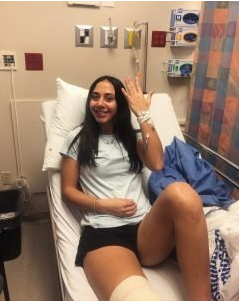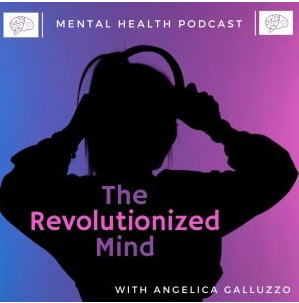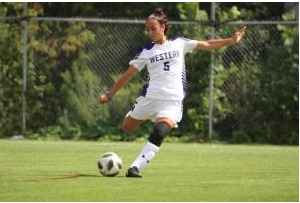Learning to Live with my Dark Cloud
TW: This Unsinkable story discusses self-harm and suicidal ideation. We invite our community to read it only if it's the right time for them! If you're struggling, please reach out to the Crisis Text Line or Kids Help Phone. ...
Let me start off by emphasizing that just because I am writing this article does not mean that I have everything figured out. I am in a much different place than I was 8 years ago? Absolutely. But I still struggle sometimes and that’s okay. There isn’t a quick fix to this and opening up about what you’re going through/have gone through does not solve the problem. It may take some of the weight off, validate other people, and show that you are human just like everybody else. But healing is a lifelong journey. You learn a lot, grow a lot, and change a lot, and that is a beautiful thing.
My name is Angelica Galluzzo and I am 23 years old from Newmarket, Ontario. My story consists of several layers with lots of ups and downs. If there is one thing you take away from reading this today, I hope it’s that you realize that adversity is not always a bad thing. I started really struggling when I was in high school. But you never would have known. I was an elite athlete, a strong student, a social person, and someone that seemed to have all her sh*t together. With a Division 1 scholarship, good grades, and reliable support around me, my future looked promising. And it was. Except for the fact that my mind was secretly highjacked by this dark cloud that is better known as, depression. It was a scary time. I had set all these high standards for myself, everyone had expectations for me to succeed- everything was incredibly overwhelming. It wasn’t the pressure to achieve all this stuff that was overwhelming though, that’s the weird thing. These expectations and endless commitments are what I believe actually saved me. Because, when I was alone with nothing else to do, that dark cloud got the best of me. My thoughts were overpowering. My emotions were unbearable. My anxiety would send my mind and body into panic. My depression would send me back into numbness. At some point, it would all become too much. I would grab the knife that I kept under my bed and just start pressing it into my skin trying to feel anything other than what was happening in my mind and body. When that didn’t work, I started scratching at my skin and the burning sensation meant it “was working”. I could finally escape that terror and be met with an odd comfort provided by this new feeling. But I had to be conscious of course. I had soccer the next day. Nobody could ever see this or think that I’m someone who does that. Besides, so many people have it worse than me (*insert face palm*). I would lay in bed, silently crying, praying that something would just mysteriously happen to me, so I didn’t have to do it to myself and hurt the people I loved. I was able to hide it and force myself to appear as that strong, capable, and outgoing girl though. Long sleeves, fake smiles, being social, overachieving- checking all the boxes.
Identity was a grounding factor for me during this time. I had to keep up this image. But man did that get exhausting. I felt so ashamed. I had everything: a roof over my head, food on the table, people that loved me, an abundance of opportunities, and so much more. But the pain I was feeling was a million times stronger than any sense of gratitude I could even fathom. My emotions were all over the place. I took “moody and hormonal” teenager to the next level. I went from happy to sad to completely numb in the span of minutes. I learned to dissociate when things became hard because it was easier to feel nothing than to face those inner demons. I was unpredictable, irritable, and intense in all my emotions, both good and bad. Soccer was my saving grace. One of the only things that kept me going during that time was knowing that I had a commitment to my team. When I was on the field, nothing else mattered. I was happy. It was the perfect escape from those terrifying thoughts and feelings. My passion for the game only grew stronger as I continued to find meaning and purpose in my life through my role as an athlete. And more, as a captain. This captaincy was highly related to my struggle with identity because I knew I had to show up for my team. People were relying on me. I couldn’t let them down. Oh ya, and did I also mention that I suffered 5 knee surgeries in 5 years? That’s a story for another day but important to note as it heavily contributed to my mental health struggles and finding my sense of identity at that time. Losing my sport felt like losing everything. Now, I didn’t have that coping mechanism, escape, or commitment to other people. It was just me and my recovery.
I continued to mask my depression, self-harm, suicidal ideation, and more through becoming the most dedicated injured kid you’d ever see. I was all smiles and determination to get back on the field in front of other people, but absolutely crushed behind closed doors. Who was I without soccer? How could I be a captain without being on the field? Oh, how badly I just wanted to wither away. Long story short, my family found out about what I was going through after some traumatic events involving suicidal behaviour. I was brought to the hospital, began the therapy journey, put on medication, and all that typical stuff. To say that “cured” or “fixed” me would be a lie. To say it was “easy” or “linear” would be a lie. But I can absolutely confirm that it did feel a whole lot better to know that other people were now aware of the severity of the depression that I was suffering from at that time. It became okay for me to show that I was sad, I had support for when things got heavy, and it was no longer just me against those demons.
Fast forward to today and a lot has changed. I transferred back home, reassessed personal relationships, and started prioritizing myself and my own needs. I am no longer in school, my varsity career has ended, and all those expectations have gradually disappeared. Do I still struggle with depression? I do. Do I sometimes fall back into old habits? I do. But the difference now is that I have learned to grow with my illness, instead of against it, and that has been the single greatest decision that I could have ever made for myself. Truly, my heart hurts for that girl who was consumed by the dark cloud. She had a lot going on. But if she could see how she used her pain to put her in the position that she’s in today, she would be so proud (but she probably wouldn’t believe you).
I decided to start a podcast to not only share my story, but to provide others a safe space to do the same. I wanted a platform that allowed me and my guests to raise awareness, educate, have difficult/important conversations, offer new ideas, and entertain all at the same time. Although it’s only been a little over a year of my podcasting journey, I believe that I have grown a significant amount in many areas of my life, including my own self-awareness, degree of empathy and compassion, perspectives, and more! I truly believe in the power of vulnerability and community. Brené Brown has taught me all about “speaking shame” and I could not agree with her more. When we unveil these not so good parts of the human experience, we create an opportunity to work together to identify these issues and improve our connections with each other on the deepest of levels. Then we begin to slowly unmask (not the COVID kind) each other, one story at a time. And this is true power.
The Revolutionized Mind can be found all on podcasting platforms and social media sites @therevolutionizedmind. I am always looking for ways to expand my audience, connect with various guests, and to positively impact society in whatever manner I can. Please don’t ever hesitate to contact me if you’re interested in connecting further. Thank you for reading this snippet of my story and remember, there is ALWAYS a light at the end of the tunnel, even if you can’t see it right now!
You can find our more about The Revolutionized Mind here.
Unsinkable Storytelling Author: Angelica Galluzzo



